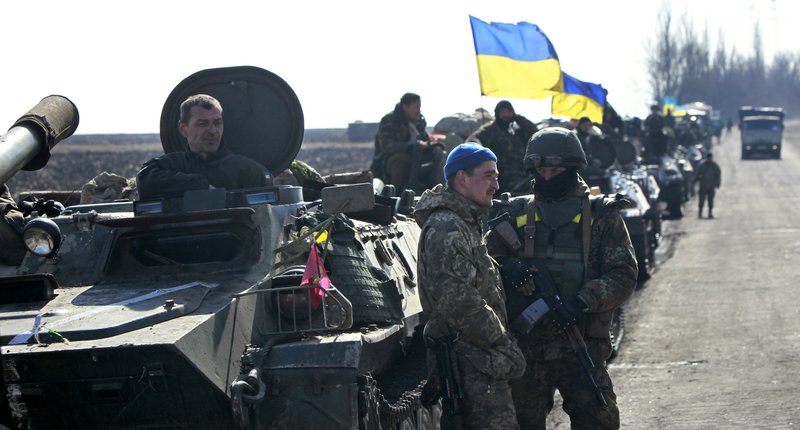NOVOAMVROSIIVSKE, Ukraine -- The piecemeal pullback of heavy weapons Friday from the line separating government and rebel forces in Ukraine has boosted the prospects for peace, although both sides are warning of their readiness to resume fighting if necessary.
The withdrawals are in compliance with a cease-fire agreement that also envisions the mass release of captives -- including those Ukrainian soldiers still being used as labor for the task of recovering the bodies of fallen troops.
In the morning, Russian-backed rebels moved Grad rocket launchers to a location 43 miles back from areas that have even in recent days seen isolated skirmishes. Associated Press journalists followed four trucks carrying the launchers from the rebel stronghold of Donetsk to a cement factory in the village of Novoamvrosiivske, near the Russian border.
Later, AP reporters saw Ukrainian troops pulling back 100mm caliber anti-tank guns from the front line near the government-held town of Artemivsk. Ukrainian officials announced the start to the pullback of their weapons Thursday.
The distance over which weapons must be withdrawn varies, depending on their power and range, between 30 miles and 90 miles. Those specifications and other terms were laid out in a peace plan hashed out in marathon talks Feb. 12 among the leaders of Ukraine, Russia, Germany and France.
The weapons seen by the AP represent a minute fraction of the firepower believed to be at either side's disposal. Separatist officials said they have almost completed the withdrawal of their heavy weapons, but there has been no independent confirmation of that claim.
Ukrainian military spokesman Col. Andriy Lysenko has accused separatists of withdrawing only a part of their weaponry.
They are "pulling back their equipment only partially and over a distance that can be covered in the space of 30 minutes," he said.
Lysenko also said rebels had moved around a column of military hardware, including Grad launchers, from Donetsk to another front-line location near the government-held port city of Mariupol. He offered no evidence for his claims.
The withdrawal process is being overseen by hundreds of monitors with the Organization for Security and Cooperation in Europe, which has complained that the warring sides have been uncooperative. The organization is expected to produce assessments on how smoothly the pullback has gone over the coming days.
Alexander Hug, the deputy chief monitor for the organization's mission in Ukraine, said Friday that observers were not yet able to confirm whether either side was complying with their commitments.
"Both sides have shown that they're willing and also able to actually move heavy weapons away from the contact lines," Hug said.
However, "that still is not a confirmation that there is compliance with the withdrawal process or an actual confirmation that all the weapons have been withdrawn," he added.
Despite some progress in implementing the peace concord, Ukrainian President Petro Poroshenko said at a military cadet graduation ceremony Friday that the country's army would swiftly rebuff any hostilities if unrest resumes.
"Our troops are at all times prepared to return equipment to their former positions and quickly fend off the enemy," he said.
That echoed remarks by Donetsk separatist leader Alexander Zakharchenko a day earlier, who warned Ukraine of the cost of any aggressive moves.
"Military equipment will be returned to their positions. Any attacks on our cities and villages will be nipped in the bud," Zakharchenko said.
Meanwhile, Ukraine is lobbying the international community to support its struggling armed forces with equipment.
Britain's Foreign Secretary Philip Hammond said Friday that he did not believe supplying Ukraine with weapons was the right thing to do "at the moment."
"We're clear there has to be a political solution ... it cannot be resolved by military means alone," he said. "But we reserve our right to review that judgment if the situation on the ground changes."
Under the peace agreement, the warring parties are also bound to release all their captives. Neither side has revealed how many captives they hold, but rebels handed over 139 captive Ukrainian soldiers last weekend in exchange for 52 people held by the government.
Captured Ukrainian soldiers still held by the separatists are being used to collect the bodies of fellow troops killed in recent fighting.
AP reporters Friday saw Ukrainian servicemen gathering the remains of at least one soldier in Novohryhorivka, a village outside the strategic railroad town of Debaltseve, which was captured by rebel forces last week.
The bodies of another 14 Ukrainian soldiers killed in recent fighting already lay Friday at the morgue in the main rebel city of Donetsk.
A rebel fighter at the morgue said the soldiers, who he said had died in Debaltseve, would be handed over to the government as soon as the necessary arrangements were in place.
Information for this article was contributed by Karel Janicek and Geir Moulson of The Associated Press.
A Section on 02/28/2015

